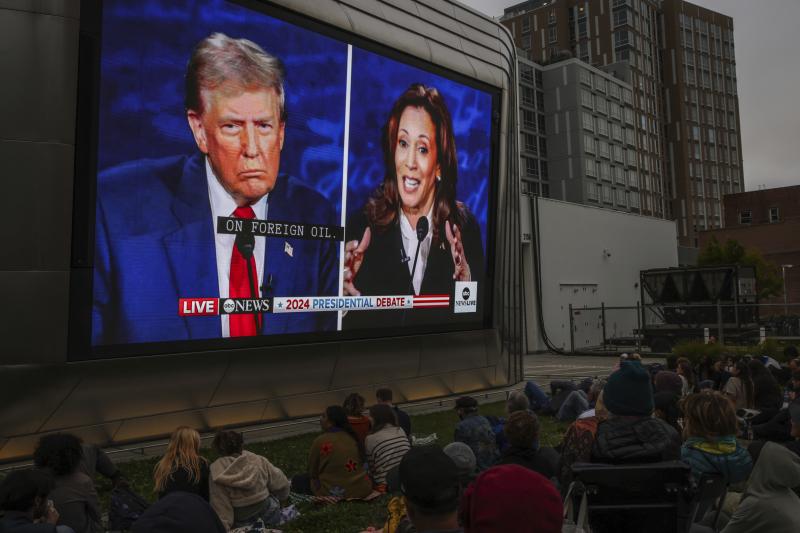US Vice President Kamala Harris in the presidential debate on Tuesday night slammed former US president Donald Trump for not protecting US interests against China, and lambasted his public praise for Chinese President Xi Jinping (習近平) during the COVID-19 pandemic.
“Under Donald Trump’s presidency, he ended up selling American chips to China to help them improve and modernize their military,” Harris said during the televized debate.

Photo: San Francisco Chronicle / AP
“Policy about China should be making sure the United States of America wins the competition for the 21st century,” Harris added, claiming that Trump “sold us out” during his time in office.
China has become a top target during the US election, with Trump vowing to impose a 60 percent tariff and the administration of US President Joe Biden announcing a 100 percent levy on Chinese-made electric cars.
Beijing has, so far, resisted any move that could backfire on the world’s second-largest economy, and not made clear which candidate it prefers.
While Trump placed tariffs on more than US$300 billion of Chinese goods as president and sought to block countries from buying Huawei Technologies Co equipment for 5G networks, his opponent’s stance is lesser known after she joined the ticket late.
The debate gave Harris a chance to flesh out her policy in comments likely to be closely watched in Beijing.
China was a recurring theme, with Harris taking swipes at Trump for displays of admiration for Xi, whom Biden has publicly called a “dictator.”
“He actually thanked President Xi for what he did during COVID. Look at his tweet: ‘Thank you, President Xi. Exclamation point,’” Harris said. “We know that Xi was responsible for lacking and not giving us transparency about the origins of COVID.”
Trump commended China for its “efforts and transparency” in containing the virus on Jan. 25, 2020, at the pandemic’s dawn as the trade war was winding down.
“It will all work out well,” he posted, thanking Xi on behalf of the US people.
Trade policy was another talking point.
The Republican indicated again that he would further hike tariffs on China if elected in November, a policy Harris criticized as bad for US consumers.
The US Federal Reserve has been trying to cool US inflation, an effort that frustrating access to cheap Chinese goods could hinder.
Trump defended his record, claiming Biden had kept his China curbs because they generated too much revenue to give up.
He also pledged to clamp down on Chinese firms he said were building car plants in Mexico to skirt tariffs and flood the US market.
The sparring come amid “China Week” in the US House, as it votes on a swath of legislation clamping down on ties with Beijing.
US lawmakers earlier this week passed a bill to blacklist Chinese biotech companies and their US subsidiaries, and to publish financial information of Chinese leaders if Beijing moves against Taiwan.
Harris is largely expected to continue Biden’s approach of managing ties through “intensive diplomacy,” while rallying US partners to limit China’s access to cutting-edge chips on national security concerns.

POLITICAL PRISONERS VS DEPORTEES: Venezuela’s prosecutor’s office slammed the call by El Salvador’s leader, accusing him of crimes against humanity Salvadoran President Nayib Bukele on Sunday proposed carrying out a prisoner swap with Venezuela, suggesting he would exchange Venezuelan deportees from the US his government has kept imprisoned for what he called “political prisoners” in Venezuela. In a post on X, directed at Venezuelan President Nicolas Maduro, Bukele listed off a number of family members of high-level opposition figures in Venezuela, journalists and activists detained during the South American government’s electoral crackdown last year. “The only reason they are imprisoned is for having opposed you and your electoral fraud,” he wrote to Maduro. “However, I want to propose a humanitarian agreement that

ECONOMIC WORRIES: The ruling PAP faces voters amid concerns that the city-state faces the possibility of a recession and job losses amid Washington’s tariffs Singapore yesterday finalized contestants for its general election on Saturday next week, with the ruling People’s Action Party (PAP) fielding 32 new candidates in the biggest refresh of the party that has ruled the city-state since independence in 1965. The move follows a pledge by Singaporean Prime Minister Lawrence Wong (黃循財), who took office last year and assumed the PAP leadership, to “bring in new blood, new ideas and new energy” to steer the country of 6 million people. His latest shake-up beats that of predecessors Lee Hsien Loong (李顯龍) and Goh Chok Tong (吳作棟), who replaced 24 and 11 politicians respectively

Young women standing idly around a park in Tokyo’s west suggest that a giant statue of Godzilla is not the only attraction for a record number of foreign tourists. Their faces lit by the cold glow of their phones, the women lining Okubo Park are evidence that sex tourism has developed as a dark flipside to the bustling Kabukicho nightlife district. Increasing numbers of foreign men are flocking to the area after seeing videos on social media. One of the women said that the area near Kabukicho, where Godzilla rumbles and belches smoke atop a cinema, has become a “real

‘POINT OF NO RETURN’: The Caribbean nation needs increased international funding and support for a multinational force to help police tackle expanding gang violence The top UN official in Haiti on Monday sounded an alarm to the UN Security Council that escalating gang violence is liable to lead the Caribbean nation to “a point of no return.” Special Representative of the UN Secretary-General for Haiti Maria Isabel Salvador said that “Haiti could face total chaos” without increased funding and support for the operation of the Kenya-led multinational force helping Haiti’s police to tackle the gangs’ expanding violence into areas beyond the capital, Port-Au-Prince. Most recently, gangs seized the city of Mirebalais in central Haiti, and during the attack more than 500 prisoners were freed, she said.